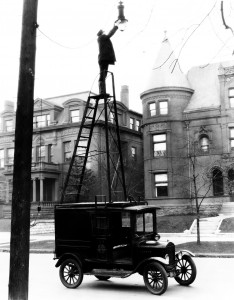One of the duties of the Cotuit Fire District is operating and maintaining street lights for the district.
If you have any questions, need to report a faulty street light, or need a light adjusted, please contact the Treasurer’s office by leaving a voice mail at (508) 420-3000 or by emailing Lisa Haven, at lhaven@cotuitfiredistrict.org.
___________________
LED Lighting
We are pleased to be converting street lights to LED (light emitting diode) lamps which will save us not only on energy use, but on labor.
LED lamps have a bright white light which uses a small fraction of the electricity that conventional sodium or even compact fluorescent bulbs. LEDs also last years longer than conventional or florescent bulbs. Longer lasting LEDs save money in labor costs to maintain and replace lamps. While these lights cost more initially, they pay for themselves quickly.
As an added benefit, LED lights are generally considered to be lower “light polluters.” Street light pollution happens when light sources (such as sodium lights) shine upward and outward into the night sky. Light pollution not only effects stargazing, it impacts the environment in unexpected ways such as changing animal habitat and migration patterns. Want to learn more? Read this article in National Geographic.
We were fortunate to receive grant money to help offset the cost of these bulbs.
Different streets have been outfitted with different arrays of bulbs: more bulbs in places such as “downtown” Cotuit where we want brighter streets; fewer bulbs in the array on residential streets.
Want to learn more? Here is an interesting technical paper about LED versus several other types of commonly used light sources.
History of Street Lights in Cotuit
Courtesy Historical Society of Santuit and Cotuit
Written by: GORDON M. BROWNE, JR., July 14, 1967
The third service specifically provided for in the enabling legislation of 1926 was street lights. For some time a wish for lights in Cotuit and Santuit had been widely expressed, but such a proposal had also been widely opposed by many of the summer residents, who felt that oyster shell roads without lights preserved the quaint, small village atmosphere they valued in Cotuit. This latter view seems to have been influential, for when the first article calling for installation of street lights was brought before the 1928 District Meeting, the proposal was voted down, and a request for a committee to meet with officials of the electric company to make plans for lighting the streets was indefinitely postponed. The following year, however, the voters appropriated $2 000 for the installation of the first 50 lights. Thereafter, each additional light had to be requested in writing and approved by the District, either directly or through approval of an in crease in the lighting budget. There is record of only one refusal of such a request, however, and that was later granted.
There have been occasional interruptions in service through the years because of storms, but the only planned interruption occurred in 1943, and that was only momentary. The war had brought economic hardship to the Cape. Money for taxes was scarce. Further, the war imposed frequent blackouts and brownouts on coastal communities, rendering street lights ineffective. At the 1943 District meeting, voters seeking to save money and to lower taxes, voted down the annual street light appropriation. Apparently even the movers of this plan had not expected it to succeed, and there was general consternation in the meeting when the voters realized what they had done. At last, a motion to reconsider was offered, the original appropriation was moved again, and this time it passed. Cotuit could not remain long in the dark.
One last item concerning street lights is noteworthy as a comment on our changing ways of life: In 1947, the Prudential Committee quietly noted that they planned to ask for an increase in the lighting budget so that the lights might be left on all night instead of only part of the night. No one could any longer be sure he knew the hour at which decent folks would be home in bed.

